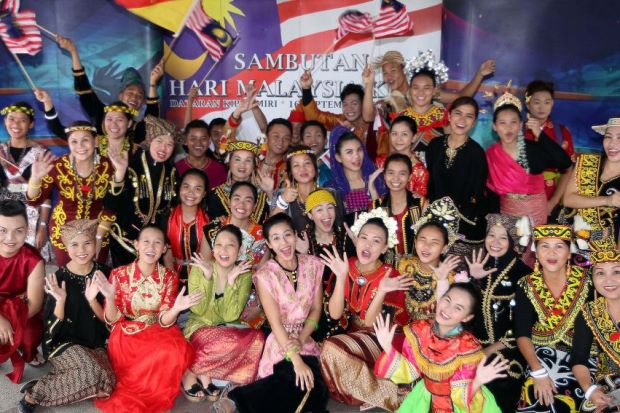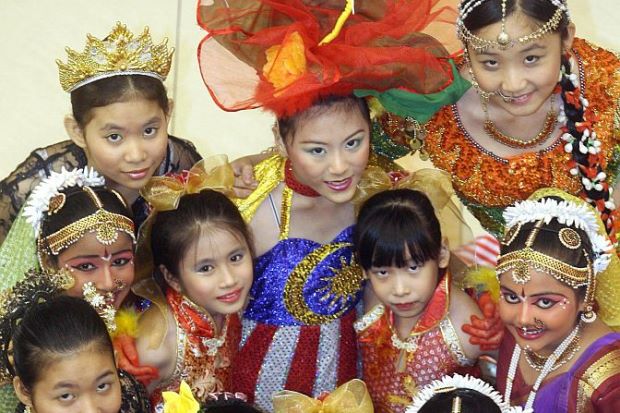
Filepic: Malaysian multi racial of all background that symbolize Malaysia.
Removing the race columns from all forms would be a giant step in achieving national unity, as it would emphasise oneness.
IT’S a small step but the Sabah and Sarawak governments must be commended for their efforts to scrap the term “dan lain lain” or “others” in the race column in government forms.
While the three major races – Malay, Chinese and Indian – have their own columns in these forms, all other minorities in the country simply were classified as “dan lain lain”. It is not wrong to say that the term “dan lain lain” is demeaning and is almost equivalent to the term “alien”.
In fact, after 57 years of independence, it is incredible that we are still asking Malaysians to state their race.
While the Federal Government has insisted that there is a need to keep the race columns to help the government monitor the development of each race, it could certainly emulate what Sabah and Sarawak have done.
Even in the peninsula, putting minorities under the “dan lain lain” column would hardly help the government get an accurate picture of these ethnic groups, who are Malaysians, like everyone else.
Surely, as a responsible government, it would also want to know in greater detail the position of the Eurasians, Portuguese, Siamese, orang asli and other minorities.
Last week, the Deputy Home Minister rightly pointed out that in Sarawak, those classified under the “dan lain lain” group in the state actually outnumbered the Malays, Chinese and Indians. These three races are only distinct under a peninsula-driven classification.
The Sabah government has also decided to follow Sarawak and agreed to remove the “dan lain-lain” option in the race column on government documents. Those filling in the forms can now identify their ethnicity in the blank space provided.
According to Sabah State Secretary Tan Sri Sukarti Wakiman, “the state government will come up with a list of ethnic races in Sabah to be handed to the National Registration Department to reference in processing birth registration applications and Malaysian identity cards for those from Sabah”.
The “dan lain-lain” column in the race category has been a point of contention among Borneo’s native races who are mostly from ethnic communities, with Sabah itself having over 30 ethnic groups.
But it would not be wrong to say that many Malaysians have long questioned the need to state one’s race, and religion, on any form.
The requirement not only creates a deep psychological impact on Malaysians but gives the impression that we are officially divided by our racial and religious identities five decades after independence.
We will continue to be regarded as a country that is obsessed with race and religion when our nationality takes a back seat. We proudly see ourselves as Malaysian when we are overseas but the moment we step back on Malaysian soil, we are reminded about our race and our religion.
In many countries, it has become taboo, even unlawful, to state one’s religion in any official form. Religion is deemed as a private matter which no one, especially the government, has any business to ask.
In fact, Indonesians are required only to state their nationality in official forms, never their racial identity.
It is a diverse country like ours but because of assimilation, one cannot distinguish an Indonesian’s race and religion simply from the person’s name.
Removing the race columns from all forms would surely be a giant step in achieving national unity, as it would emphasise oneness.
While the Federal Government has given various reasons as to why it needs to maintain the race column, it could, for a start, eliminate this column in forms where the issue of race has absolutely no bearing.
As an example, if a Malaysian wants to seek the approval of the municipal council to carry out renovation of one’s property, it makes little sense that he has to state his race in the application form.
This may be a small start, but we need to do away with such requirements, especially if they have no bearing on the collation of statistical data.
This need to identify our race goes beyond official matters. I was at a shopping mall recently and decided to sign up for a discount card which cost me RM15. Guess what? I had to state my race in the application form.
To be fair, in the United States, there are still certain forms which require information about one’s race. The US Department of Housing and Urban Development still insists on racial information, especially when one is seeking assistance, but there is a disclaimer – there’s no penalty if you choose not to fill up the entire form because you do not want to state your race.
The private sector should also remove such columns about race and religion from their job application forms. They should also not state their racial preferences when they advertise their job vacancies.
Employers, both in the private and public sectors, must be able to see the tremendous advantage of having a multi-ethnic and even multi-national workforce.
Sabah and Sarawak have made a bold move which may provide the necessary catalyst for further changes. But as with any change, there will always be fears and concerns.
Those who are against removing the race column have expressed reservations on the loss of rights, privileges and identities. These are sentiments brought up by well-meaning people. We have to respect and understand certain realities.
But at the same time, we must also not be fearful of embracing changes – Malaysia and Malaysians need to grow up.
If we aim to be a developed nation, it is necessary that we also accept values fitting of a developed nation. Narrow sectarian, religious and ethnic issues are hallmarks of a Third World country. What Sabah and Sarawak have done would hardly meet calls to remove the race column but at least, “dan lain lain” has disappeared.
There will still be the need to state one’s race but at least we have given recognition and respect to our fellow Malaysians on how they should be identified in this category. It’s a baby step but we must congratulate the Sabah and Sarawak state governments. It’s a good start.








